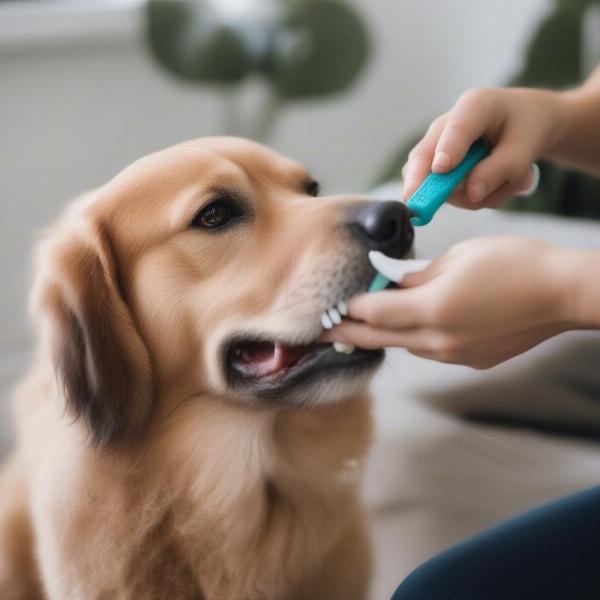Bleeding gums in dogs can be alarming, but it’s a relatively common issue. Understanding why your dog’s gums are bleeding is crucial for providing appropriate care and ensuring their overall health. This article will explore the various causes of bleeding gums in dogs, ranging from simple dental issues to more serious underlying health problems. We’ll also discuss treatment options and when it’s time to seek immediate veterinary attention.
Understanding the Causes of Bleeding Gums in Dogs
Several factors can contribute to bleeding gums in dogs. The most common culprit is periodontal disease, which is caused by the buildup of plaque and tartar on the teeth. This leads to inflammation and infection of the gums, causing them to bleed easily. Other potential causes include:
- Trauma: Chewing on hard objects, like rocks or bones, can injure the gums and cause bleeding. Even a vigorous game of tug-of-war can sometimes lead to minor gum trauma.
- Foreign objects: Splinters, sticks, or other foreign objects lodged between the teeth can irritate the gums and cause bleeding.
- Clotting disorders: Certain medical conditions can affect blood clotting, making even minor injuries bleed excessively.
- Oral tumors: Although less common, tumors in the mouth can cause bleeding gums.
- Certain medications: Some medications, such as anti-inflammatory drugs, can increase the risk of bleeding.
Treating Bleeding Gums in Dogs
The treatment for bleeding gums depends on the underlying cause. For periodontal disease, professional dental cleaning by a veterinarian is essential. This involves removing plaque and tartar buildup, often under anesthesia. chlorhexidine mouth rinse for dogs can also be helpful in managing gum inflammation. If trauma is the cause, your vet may recommend pain medication and antibiotics to prevent infection. For foreign objects, removal by a vet is necessary. If a clotting disorder or oral tumor is suspected, further diagnostic tests and specialized treatment will be required.
When to Seek Veterinary Care
While occasional minor bleeding might not be a cause for immediate concern, it’s important to monitor your dog’s gums regularly. You should seek veterinary attention if you notice:
- Persistent bleeding gums
- Excessive bleeding
- Bad breath
- Difficulty eating
- Swelling of the gums or face
- Lethargy or other signs of illness
What if my dog’s gums are bleeding slightly after chewing a toy?
If your dog’s gums are bleeding slightly after chewing a toy, it’s likely due to minor trauma. Monitor the bleeding and ensure it stops within a reasonable timeframe. If the bleeding is persistent or excessive, consult your vet.
Can I brush my dog’s teeth at home to prevent bleeding gums?
Yes, regular brushing is essential for preventing periodontal disease and bleeding gums. Use a plate dogs and toothpaste specifically formulated for dogs.
Are there any home remedies for bleeding gums in dogs?
While some home remedies, like rinsing with saltwater, might offer temporary relief, it’s crucial to address the underlying cause. Consult your veterinarian before trying any home remedies.
 Brushing a dog's teeth
Brushing a dog's teeth
Conclusion
Bleeding gums in dogs shouldn’t be ignored. While some causes are relatively minor, others can indicate a more serious underlying condition. Regular dental care, including brushing and professional cleanings, is crucial for preventing periodontal disease and maintaining your dog’s oral health. If you notice any signs of bleeding gums, consult your veterinarian for a proper diagnosis and treatment plan. Early intervention is key to preventing more serious complications.
FAQ
-
What are the most common causes of bleeding gums in dogs? Periodontal disease and trauma are the most common causes.
-
How can I prevent my dog’s gums from bleeding? Regular brushing, professional dental cleanings, and avoiding hard chew toys can help prevent bleeding gums.
-
When should I be concerned about my dog’s bleeding gums? If the bleeding is persistent, excessive, or accompanied by other symptoms like bad breath or difficulty eating, you should contact your vet.
-
Can bleeding gums be a sign of a serious illness in dogs? Yes, bleeding gums can sometimes be a symptom of a clotting disorder, oral tumor, or other underlying health problem.
-
What should I do if my dog’s gums are bleeding heavily? Seek immediate veterinary attention.
-
Can certain foods cause bleeding gums in dogs? While not a direct cause, a poor diet can contribute to dental problems that may lead to bleeding gums.
-
How often should I have my dog’s teeth professionally cleaned? The frequency depends on your dog’s breed, age, and overall dental health, but most vets recommend annual cleanings.
Expert Insight from Dr. Emily Carter, DVM: “Regular dental care is just as important for dogs as it is for humans. Brushing your dog’s teeth daily and scheduling regular professional cleanings can significantly reduce the risk of periodontal disease and bleeding gums.”
Expert Tip from Sarah Miller, Certified Dog Trainer: “Choosing appropriate chew toys for your dog can help prevent gum injuries. Avoid hard objects that can chip teeth or damage gums. Opt for softer, durable toys designed specifically for chewing.”
ILM Dog is a leading online resource for dog owners worldwide, offering expert advice on dog breeds, health, training, nutrition, grooming, and much more. We are committed to providing accurate, practical information to help you give your furry friend the best possible care. For further assistance, please contact us at [email protected] or call +44 20-3965-8624. Visit ILM Dog for more valuable resources and expert guidance on dog care.